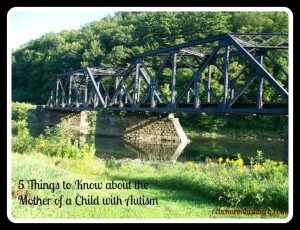 This is the third in a series of five posts dealing with things to know about the mother of a child with autism (relevant for any set of special needs). The full text to this series is authored by Amy Fenton Lee, is being used with permission, and can be found at the blog for The Inclusive Church.
This is the third in a series of five posts dealing with things to know about the mother of a child with autism (relevant for any set of special needs). The full text to this series is authored by Amy Fenton Lee, is being used with permission, and can be found at the blog for The Inclusive Church.
I particularly enjoyed reading this portion of Amy Fenton Lee’s blog. This section of the blog deals with everyday feelings that mothers have, but also with how church ministry leaders can help parents of children with autism to overcome fears and have their children actively participating in church activities.
Part 3: She fears exclusion.
Few things feel as threatening to a mother as does something that jeopardizes others’ love for and acceptance of her child. The autism diagnosis is that big, bad label that justifiably feeds a mother’s greatest fears for her son or daughter.
*Will he sit alone at the lunch table for the rest of his school career?
*Will she ever be invited to a birthday party?
When children’s ministry teams understand this fear of exclusion, they can better understand why so many parents choose not to reveal their child’s diagnosis to the church. While some parents worry that the church may refuse care for their child, oftentimes the fear of peer rejection is an even greater deterrent to disclosure.
 I think that any mom (or dad) can understand the feelings described in the first part of the excerpt from Amy’s blog. That seems to be a fear over which a lot of parents I know, express concern. However, knowing some parents of children with autism, and having worked in special education, I agree with Amy - the label of “Autism” does make a parent more concerned with how his or her child will be accepted.
I think that any mom (or dad) can understand the feelings described in the first part of the excerpt from Amy’s blog. That seems to be a fear over which a lot of parents I know, express concern. However, knowing some parents of children with autism, and having worked in special education, I agree with Amy - the label of “Autism” does make a parent more concerned with how his or her child will be accepted.
The reality is that autism is becoming so much more common. Depending what you read, the stats are anywhere from 1 in every 88 kids, to 1 in 50 school children. That’s why awareness and education is of the utmost importance. People need to understand what autism is, how it affects an individual and their family, and that autism is a different type of “normal”.
The second part of the excerpt deals with children’s ministry teams in churches. So much needs to be done to refocus how children’s ministries work, in light of the prevalence of autism in today’s society. I’m not necessarily meaning that we need to change the ministry, but that we need to “teach the teachers” how to help our kids. Amy’s blog lists some wonderful ways to do that. I’d recommend you just hit the link and read what she has to say on this topic.
Tim & I are blessed to be part of a church with a wonderful children’s ministry. The teachers know and care for the kids. We have explained, to some extent, our guy’s issues so that the teachers can be aware. There is definitely room for growth in terms of teaching the teachers how to work with special needs children. But it’s wonderful when you can say to the teachers, “It’s not that my kid isn’t listening; it’s that they learn differently” and then find that the teachers are actively pursuing more information on the particular needs, to help your child.
With autism and so many other special needs, there is a real need for the child to be involved socially in their peer group - not just to show up, but to actively participate. As parents, we have to make sure that people understand HOW to help our kids. We don’t want to fear exclusion; we want to know that our kids are participating and being included!
Did you miss the first two parts? You can catch up here:
Part 1 - She may feel relief from a diagnosis
Part 2 - Grief vs. Hope












